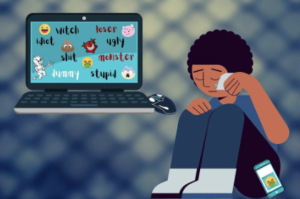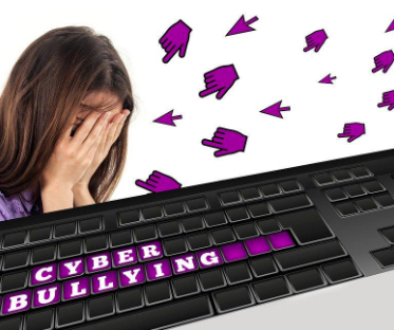What are the Effects of Cyberbullying?

Also referred to as cyberstalking, cyberbullying has emerged as a serious social problem in recent years. The latest statistics reveal that cyberbullying is happening more among young children and teenagers – than among adults.
A Pew Research study shows that 59% of teenagers who regularly browse the Internet have experienced cyberbullying – as compared to just 33% of adults. Further, 37% of young children have experienced cyberbullying, while 30% have been targeted more than once.
As a parent, you may not have endured cyberbullying yourselves during your growing days. This makes it challenging for you to understand the effects of cyberbullying on your growing child. As compared to face-to-face bullying, cyberbullying is much worse as victims have to endure it across the clock.
In this blog, we shall look at some of the emotional, mental, and physical effects of cyberbullying on your children. Let’s first start with the emotional effects of cyberbullying.
4 Emotional Effects of Cyberbullying
32% of kids who have experienced cyberbullying have experienced emotional effects like distress, embarrassment, or even fear of being hurt. Victims often blame themselves for being cyberbullied.
Here are 4 emotional effects that your child could be going through following an incident:
- Humiliation
Cyberbullying can have a humiliating impact on the minds of young people. As part of cyberbullying, negative content like nasty comments, posts, and videos is shared publicly on social media platforms. Hence, victims often feel exposed and humiliated. This can have a serious emotional impact on young children.
- Feeling of isolation
Following the cyberbullying experience, young kids often have a feeling of being isolated or even ostracized in school or among their peers. This can be painful for young children who need to feel like they belong to their friend’s group. As kids become more isolated, it can lead to more incidents of online abuse.
After a negative experience, children are often instructed to stay away from social media or their mobile phones. This can further elevate their feeling of isolation, as they are cut off from their real friends and connections.
- Anger
Anger is the most common response by children to any cyberbullying experience. Victimized children often think of how to take revenge or retaliate against their offenders. Worse still, cyberbullied children often become cyberbullies themselves and target innocent children.
- Powerlessness
Young victims of cyberbullying often feel vulnerable and powerless against their offenders. When they are emotionally damaged, they start looking at the entire world as bullies and perpetrators. When offenders remain anonymous, children find it difficult as to whom to trust (or not trust).
Next, let’s discuss the mental effects of cyberbullying on growing children.
4 Mental effects of cyberbullying
Cyberbullying can severely impact your children mentally – and they may lose interest in activities that made them happy previously.
Here are 4 mental effects of cyberbullying on your child:
- Severe depression and anxiety
Besides feeling isolated or angry, cyberbullied children often go through extreme anxiety or depression. This is particularly true for children who have previously experienced trauma or are facing problems at home. Studies have shown that 93% of victims have reported feelings of sadness and powerlessness.
- Low self-confidence and self-esteem
Cyberbullying can erode the self-confidence and self-esteem of its victims, which can lead to depression and anxiety. Most often victims end up with a feeling of dissatisfaction with themselves. Hence, they develop emotions of low self-worth and value.
- Poor academic performance
Cyberbullied children often lose interest in school and academic studies following an incident. They have a higher rate of absenteeism than before. This is true if they have been cyberbullied on school premises – as they feel humiliated or shamed by abusive messages shared about them.
Overall, this can lead to a sudden drop in their school grades and performance. In a few cases, bullied students have dropped out of school or don’t pursue higher education.
- Suicidal thoughts
Recent research shows that adolescents attempting suicide have doubled since 2008. Cyberbullied children often try to cope with their experiences by harming themselves in some way. Cyberbullying increases suicidal thoughts as victims are constantly being tormented by their peers through online mediums.
Cyberbullying can also cause physical problems among victims. Let’s discuss them next.
Physical effects of cyberbullying
Besides the emotional and mental effects, cyberbullying can cause a lot of physical health problems among affected children. For instance, cyberbullied children often face sleep problems, as the experience impacts their sleeping patterns. In extreme cases, children may suffer from insomnia, nightmares, and sleeping for longer hours.
Another common effect of cyberbullying is eating disorders in children. They may either choose to skip meals frequently or indulge in binge eating. In the long run, this can lead to severe eating disorders – or loss of self-control over their eating habits.
The emotional stress caused by cyberbullying can often lead to health issues like headaches, stomach pain, or upset stomachs. In severe cases, kids can also suffer from gastrointestinal problems like frequent vomiting, and diarrhea.
Conclusion
As a parent, it’s important to notice if your growing child is suffering from any of these effects. If your child is eating or sleeping poorly for a long time, speak to them to know the reasons. At the same time, do not ignore if your child is trying to communicate with you. Communicate with them regularly to know what’s happening in their school or social circles.
If your child has already suffered from cyberbullying, it’s important to take corrective steps. Speak to a therapist or expert who can help your child cope with the effects of their experience in positive ways. Additionally, report the incident to school authorities so that they can stop future incidents of cyberbullying.



